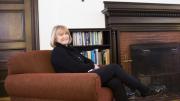Departing Faculty of Arts and Sciences (FAS) Dean William C. Kirby has attempted to set the clock ticking for completing a revision of the undergraduate curriculum, after three years of study. In a letter circulated January 20one week before the news of his personal plans was disclosedhe proposed votes this spring on legislation to effect changes in concentrations (fewer requirements, student choice of a course of study deferred from freshman year to the middle of sophomore year) and then general education (replacing the Core curriculum with distribution requirements). These issues would be followed with action on instruction in writing and speaking; advising; and then the academic calendar: possibly moving reading period and exams before Christmas, and creating a flexible January term. (The letter and underlying committee reports were bound in a single volume, as shown below, for faculty reference during debate. They appear on line, respectively, at www.fas.harvard.edu and www.fas.harvard.edu/curriculum-review.)
Kirby restated several themes from the review. One is to “recommit our Faculty to the central task of educating undergraduates.” Another is emphasis on “liberal education”specifically “resisting pressures for early specialization and professionalization” through “a curriculum of choice, incentive, and opportunity more than one of restriction and requirement.” On the latter point, Kirby hopes, new general-education courses will succeed “because they are great courses, not because they are mandated,” and students will study the world and other languages “not because of enlarged requirements… but as a result of a new set of opportunities.” Less onerous course requirements and other changes have the aim of “bringing our students and faculty together in intensive, inescapable ways,” particularly in small classes and learning groups.
Lofty though those these aims are, Kirby warns that the “history of our curricular reforms in the past century shows that Harvard has been better at making large curricular statements than it has been in improving the teaching of its undergraduates.” At this juncture, “We should be pleased for this Faculty to engage in a firm defense of the ideals of liberal education… only if… really improve what we do here.”
His letter also raises, indirectly, some of the chief obstacles. The proposed approach to general education depends on “summoning the Faculty to mount a new set of foundational courses to serve as portals to large and important areas of knowledge”not always a priority for professors intent on pursuing research and training graduate students. Similarly, given “our severe deficiencies in academic advising”a problem that looms larger if students exercise more freedom to choose coursessomething tangible has to come out of the report on that subject.
 |
| Monique Rinere |
| Courtesy of Monique Rinere |
Ford professor of human evolution David Pilbeam, chair of the committee, reviewed its recommendations, which extend from informing pre-freshmen about possible course sequences to assisting upperclassmen with concentration concerns. He noted that one-quarter of first-year students, at most, have advisers who are academic personneljust 60 or so ladder faculty (of 700) participate. He hoped to more than triple that number, and to invite informal advising, too, such as through panel discussions. Most of all, he urged colleagues to consider advising “an integral part of our role as teachers.” Doing so, he acknowledged, requires both adviser and advisee to overcome a “culture of mutual avoidance.”
Dillon professor of international affairs Jorge I. Domínguez described an ethos of low expectation. During 32 years as a faculty member, he said, he had been asked to serve as an adviser exactly twice; several colleagues echoed that experience. He asked what deans and department chairs were doing to explain professors’ duties in the curriculum under design.
Other faculty members talked about securing departmental resources to pay for the costs of advising. Two House masters suggested bringing advisers to the students: in the evening, over snacks. But even those lures, others worried, would not overcome the scarcity of qualified advisers in large concentrations such as economics. That explains interest in peer advisers, and in drawing on professional-school expertise.
Whatever the specific issues, the problem overall looms large in some faculty members’ minds. A week before FAS’s first meeting of the term on curriculum issues, scheduled for February 7, the Division of Engineering and Applied Sciences professors (many of whom object to more liberal concentration requirements and the general education proposals) suggested improving advising before any curricular changes are adopted.
But the issue of faculty engagement remains. Professor of biological oceanography James J. McCarthy, master of Pforzheimer House, pointed to empty chairs (the meeting was the least well-attended to date of those on curriculum reform) and said, “It speaks to the problem.”
 |
The spirit of a solution was expressed by Loeb professor of classical art and archaeology David Gordon Mitten, who described nourishing advising relationships and offered hints about being informal, hanging out in hallways to meet students, and sending them occasional e-mails to check in or offer encouragement. Advising is a wonderful opportunity, he said. And of the students: “They’re our bosses!”
Kirby said Harvard spent more on advising than any other college, but performed less well than it might. Given the resources, if the work were done right, it could be effective within current means. In that context, he was encouraged by what he termed the faculty’s most extensive debate ever devoted to advisingand he took to heart the challenge to FAS leaders to make it an important faculty responsibility. The same principle animates his hope for the curriculum overhaul as a whole: a vision of liberal education, his January letter said, as “the shared endeavor of faculty and students alike.”





